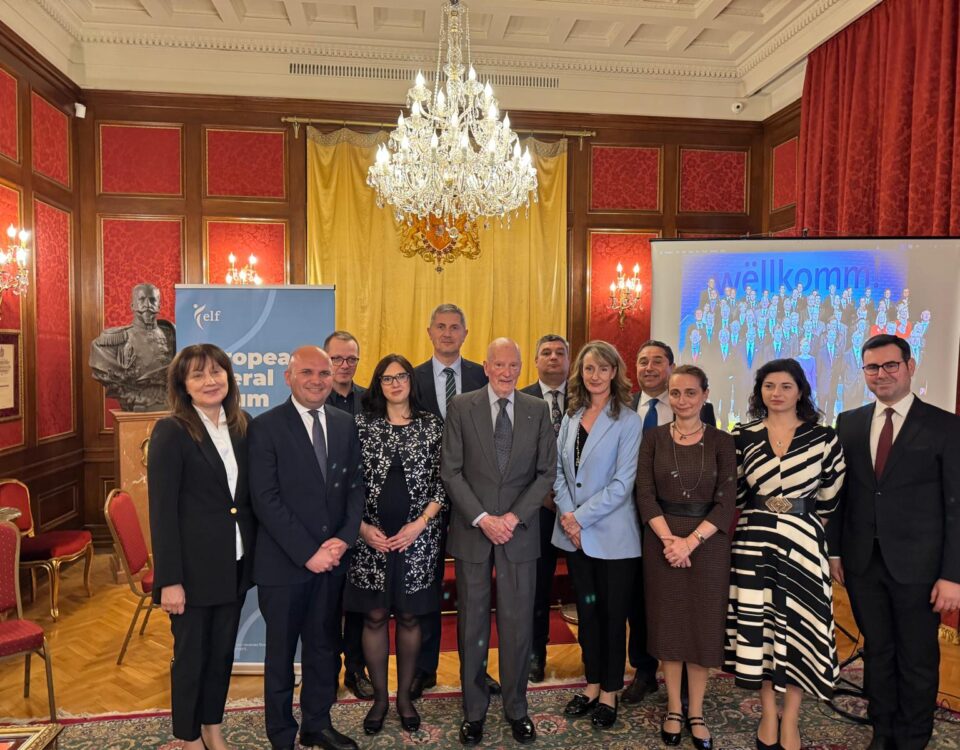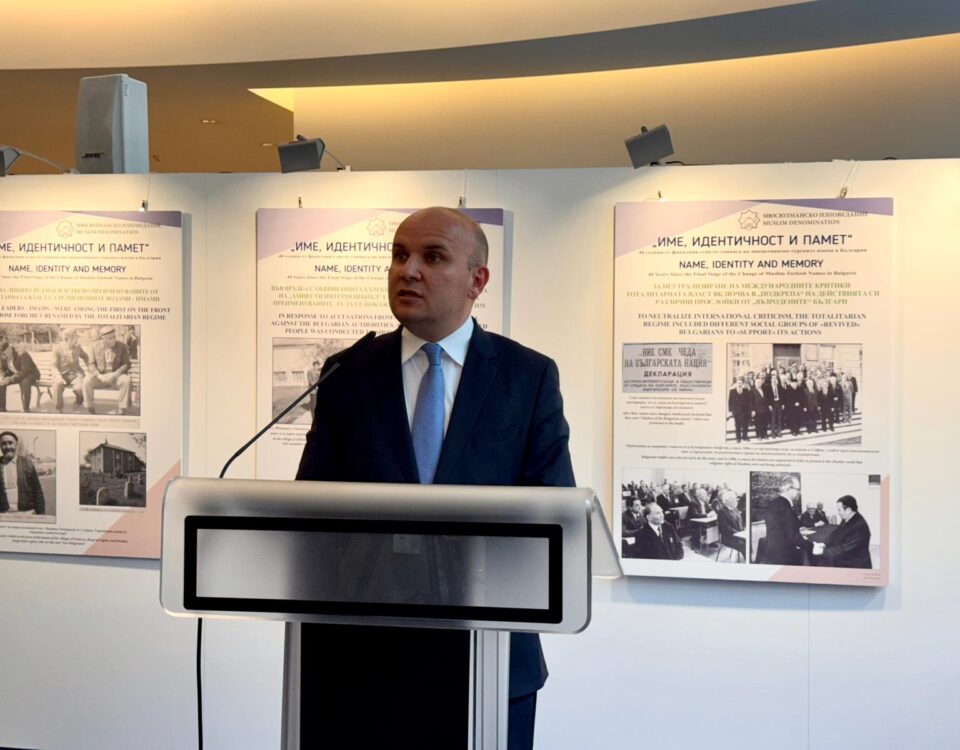Question about the growing number of killed journalists
June 16, 2015
Ilhan Kyuchyuk will take part in the “Freedom of religion? The price of faith” discussion
June 29, 2015Shared responsibility is inherent to the idea of a common value system
Maria Koleva, Brussels
Close-up: Ilhan Kyuchyuk is a Bulgarian member of the European Parliament from the Group of the Alliance of Liberals and Democrats for Europe. He is a member of the Committee on Foreign Affairs and of the Delegation for relations with the Maghreb countries and the Arab Maghreb Union and a substitute member of the Committee on Culture and Education and of the Delegation for relations with the United States. Since November 2014, Mr Kyuchyuk has been a member of the Human Rights Committee of the Liberal International, and since May 2015, he has been ambassador of the European Entrepreneurship Education Network. Between June 2013 and May 2014 he served as parliamentary secretary of the deputy prime minister of the Republic of Bulgaria in charge of the economic policy of the government. He has been a member of the Youth Movement for Rights and Freedom since 2005 and, in November 2012, he became its president. He is fluent in English, Russian and Turkish.
– Mr Kyuchyuk, Europe is faced with an unprecedented refugee wave. Do you think that the refugee relocation and resettlement schemes proposed by the Commission will prove to be the intended manifestation of the bloc’s principle of solidarity and take some of the burden off the shoulders of the hardest-hit countries?
– Over the last few months we saw horrific tragedies occur in the Mediterranean, turning it into Europe’s chillingly literal version of the name “Dead Sea”. I completely agree with the sentiment expressed by UN Secretary General Ban Ki-moon, who in a speech at the European Parliament on 27 May said: “Saving lives should be the priority!” Shared responsibility is inherent to the idea of a common value system. The Schengen Area effectively removed national borders for practical purposes, but I get the feeling that we still expect European problems to be solved by individual countries. It is obvious we need a common European policy on immigration and refugees because there is no national solution to this complex issue, a common European approach is required.
– Bulgaria is one of the countries dealing with extreme migration pressure at the moment. Is it not time for the Dublin Regulation, which so obviously saddles 5-6 Member States on the frontline with all the work and serves as a convenient excuse for the rest, to be scrapped?
– At the beginning of this year I focused my attention on the refugee issue in Bulgaria and together with a team of experts in the field we prepared a detailed analysis. It is what made me raise the question of the Dublin Regulation’s adequacy before the European Commission at the end of February. The idea of the regulation, which establishes the Member State responsible for the examination of the asylum application, i.e. the country where the application was submitted, is to prevent unwanted movement of refugees between Member States. At this point we can safely say that this model, with all of its amendments, has proven to be a failure and what we need to do is take steps to establish proportional and solidary distribution of refugees in Member States. This, in turn, leads to a lot of other questions. For example, the analysis we did for Bulgaria shows that refugees entering the country have already made up their minds and constantly make efforts to move to another country in the bloc. A large number of them know what to expect once they arrive at their final destination, but this would not be the case if they found themselves, due to the principle of proportional distribution, in one of the Baltic countries, for example, where they would find it a lot more difficult to integrate.
– As a Member of the European Parliament, what do you think of the long-delayed accession of Bulgaria and Romania to the Schengen Area, given that the two countries have been meeting all membership criteria for four years now?
– Schengen is one of the European Union’s greatest achievements and last week we celebrated the 30th anniversary from the launch of the agreement. Joining the Schengen Area is becoming a chronic problem for Bulgaria and Romania. The reality is that meeting the technical criteria for membership has not been an issue for a long time now. It has come down to a political decision and I think that the two countries’ politicians should work together to bring this higher level of European integration about.
– The topic is being unjustifiably linked to the Cooperation and Verification Mechanism. What have these reports achieved in the 9 years they have been issued and do Bulgaria and Romania even need them now?
– The party I am a member of has repeatedly stated its willingness to put all of its political and parliamentary resources into implementing the European Commission’s recommendation so that Bulgaria can be freed of the Cooperation and Verification Mechanism as soon as possible. On the other hand, if the mechanism ensures democracy and rule of law, it should stay in place.Countries aspiring to become Member States should meet the highest standards of democratic governance and human rights set out in the so-called Copenhagen criteria. The European Union’s door will remain shut for countries that do not respect freedom of speech, equality of rights or the independence of the justice system. Prospective EU membership is a strong incentive for democratic reforms, but the bloc is less stringent when it comes to Member States. That is why ALDE was the first to propose the so-called Democratic Governance Pact that would apply to Member States, too.
– You said recently in an interview that TTIP could prove to be the key to full visa liberalisation between the EU and US. Do you have any insider information from the talks or is it just what you hoped for?
– I have been working on the issue of visa reciprocity since the beginning of my term as MEP, and in early December I sent a written inquiry to the Commission. We have to be completely honest and declare in front of your readership that the discussion of the visa regime is not part of the agenda of the TTIP negotiations. There is a special joint EU-US commission working to that end, which holds sittings several times during the year and discusses the progress on the matter.On the other hand, the economic logic is such that if we wish to have an area that is completely free for investment and trade, it cannot happen without complete visa reciprocity between the EU and the USA. And we should not dwell on the EU Member States with visa restrictions, but rather on the number of Europeans, because the citizens of Bulgaria, Poland, Romania, Croatia and Cyprus number nearly 71 million, that is 14% of the European population which has been affected by the current situation.
– Is a business relations boom likely to happen, especially regarding small and medium-sized enterprises, if the free movement of people goes only in one direction? The citizens of Romania, Bulgaria, Croatia, Poland and Cyprus still need visas to travel to the United States.
– The EU and US economies are the most open and most democratic in the world and we share a lot of common values. Besides, TTIP can serve as a model for high standards to other fast developing economies, too. For the time being, however, there is an imbalance regarding access to the US market. Despite the fact that the US economy is liberal, it is very hard for European companies to make a breakthrough on the US market. But this is not the case with US companies, which can easily find fulfilment on the European market. Of course, the visa requirement is an obstacle to the local business in certain countries, but these differences ought to be removed for the benefit of the successful conclusion of the TTIP negotiations.It is important for Europe that special attention is given to small and medium-sized enterprises which are the driving force of our economy. TTIP will facilitate them in attracting more investment and business partners in the United States. SMEs have been integrated well into the chain of services of the large companies, so the profits of the large companies will inevitably lead to profits for the small businesses, too.
– There has been a lot of debating in the European Parliament on the Investor-State Dispute Settlement (ISDS) within the framework of TTIP. Given the MEPs’ attitudes, do you believe it could threaten the adoption of the Partnership at some point?
– As regards ISDS, it is clear that the system is in need of reforms. All stakeholders – the business, the governments and the civil society – agree on that issue. We need more transparency, accountability and guaranteeing the state the right to regulation. The question is how this should happen while guaranteeing the security of our European companies in the United States. An additional complication on the ISDS negotiations is the fact that Member States have already concluded 1,400 agreements with third countries. That is why so much attention is being given to the Investor-State Dispute Settlement (ISDS), which for the time being is a major stumbling block on the way to the Partnership.However, I would not like to go into details, but to look at the bigger picture. And the bigger picture is that TTIP has not only an economic but also a powerful geopolitical dimension. Moreover, TTIP has the potential to turn into the most significant project between Europe and the United States since the establishment of NATO.
– Two weeks ago you hosted a forum on youth entrepreneurship at the European Parliament. Are there suitable conditions for that in Europe given the dramatic youth unemployment rate in many Member States?
– Speaking of the future, it is paramount to educate and develop an entrepreneurial spirit and entrepreneurial mindset from school age, and consequently through lifelong improvement. What I mean is, developing young people’s abilities to transform their ideas into actions. This develops further their creativity and has an uncontested positive impact on every aspect of our lives. Entrepreneurship in the 21st century is not just a means to create business, but a way of thinking. It is the driving force of contemporary economic development, and it is not by chance that the framework for entrepreneurship and innovations is the largest component of the Competitiveness Programme of the European Union.Speaking about youth unemployment, the Juncker Commission has various tools at its disposal to tackle the issue. For example, early this year the European Parliament voted on the granting of €1 billion for 2015 under the youth employment initiative. With this change, the funding that Member States receive in advance to stimulate youth employment will increase 30 fold, and will enable nearly 650,000 young people to start a job sooner. We must not forget that education is the key factor that predetermines to a large extent the development of the young people. The most important outcome of the efforts to introduce reforms into the educational system of a given state is measured by the increase in the quality of life of its citizens and the creation of opportunities for their meaningful fulfilment. Investing in knowledge means investing in improving competitiveness, in increasing employment rates, in fighting poverty, in creating quality products, in attracting investments and in retaining the educated workforce.
Тази публикация е достъпна и на следните езици: Bulgarian




